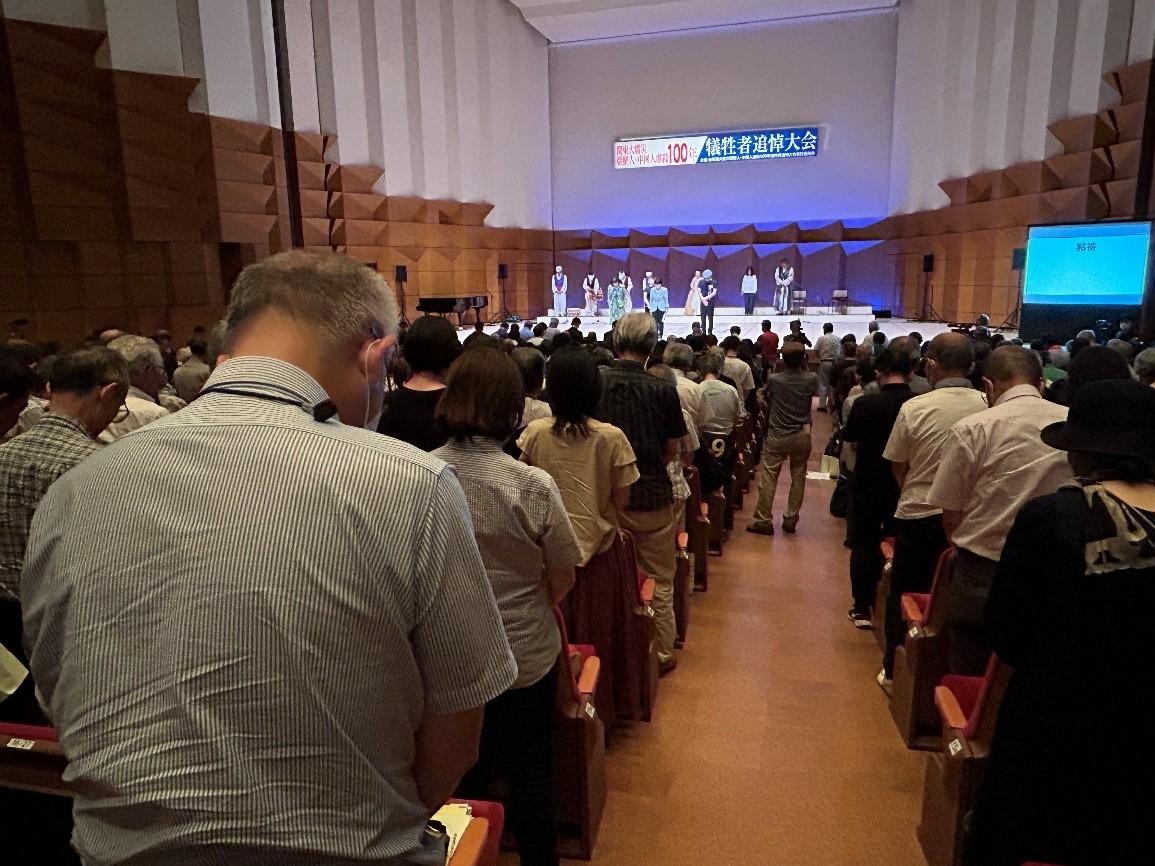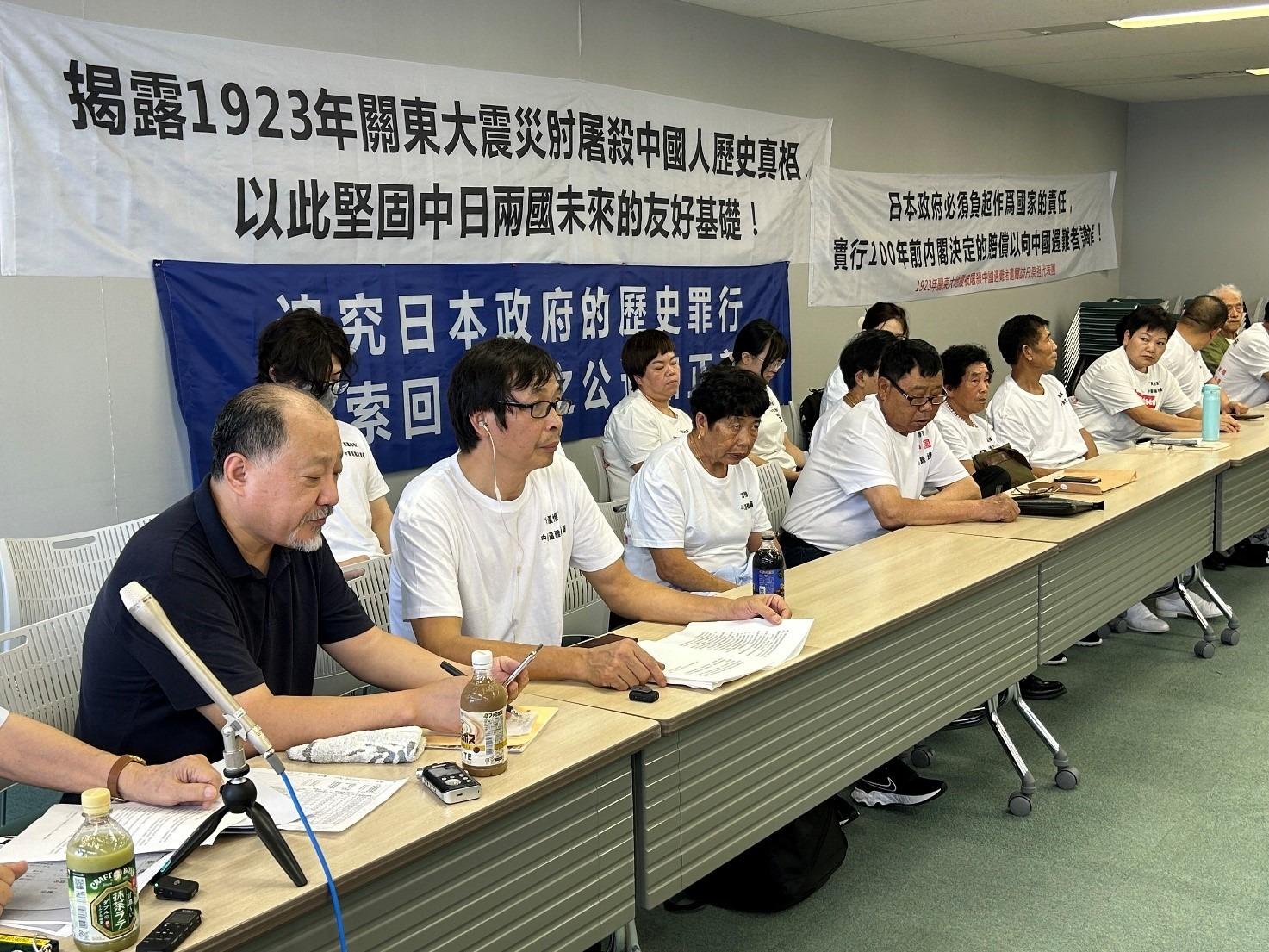 Participants of a memorial event commemorating Korean and Chinese victims massacred in the wake of the 1923 Great Kanto Earthquake observe a moment of silence in Tokyo on Aug 31, 2023. (JIANG XUEQING / CHINA DAILY)
Participants of a memorial event commemorating Korean and Chinese victims massacred in the wake of the 1923 Great Kanto Earthquake observe a moment of silence in Tokyo on Aug 31, 2023. (JIANG XUEQING / CHINA DAILY)
The massacre of people of Korean and Chinese origin after the 1923 Great Kanto Earthquake in Japan are not to be forgotten 100 years later, for preventing such horror and crimes to be repeated.
A memorial event commemorating Korean and Chinese victims murdered following baseless discriminatory rumors in the wake of the earthquake was held in Tokyo on Thursday. Organizers urged the Japanese authorities to recognize the historical fact, make due compensation to the victims’ families, learn from the lessons.
The Great Kanto Earthquake on Sept 1, 1923, was estimated to be at 7.9 in scale of magnitude, leading to over 100,000 people dead or missing. In the confusion caused by the quake, rumors spread that Koreans had “poisoned wells”. Afterwards, nearly 800 Chinese residents and over 6,000 Korean residents in Japan fell victim to massacres orchestrated by Japanese military, law enforcement and nationalist extremists, according to research data.
Commemoration of the massacre has been held every Sept 1 since the 1970s, and the governor of Tokyo sent a message of condolence for years
“Our predecessors were either working or engaged in the sales of miscellaneous items in the Kanto region of Japan,” said Zhou Songquan, executive deputy head of the preparatory committee for activities honoring the descendants of Chinese workers affected by the Kanto Earthquake, at a news conference on Thursday.
ALSO READ: Ministry: Japan should make clean break with militarism
Following the earthquake, Japanese militarists and mobs, law enforcement groups and local gangsters “premeditatedly massacred innocent civilians of foreign origin, employing despicable methods,” he said.
The immediate cause of the massacre was the spread of rumors by those with ulterior motives, inciting social panic, said Yang Yu, chief minister of the Chinese Embassy in Japan. However, “the root cause lies in Japan’s path toward militarism at the time, with rampant extreme nationalism and xenophobia prevailing within the country. This also laid the groundwork for Japan’s later aggression against foreign nations, causing deep and profound disasters for China and other Asian countries.”
Commemoration of the massacre has been held every Sept 1 since the 1970s, and the governor of Tokyo sent a message of condolence for years. But in 2017, right-wing governor Yuriko Koike stopped sending the message.
In doing so, the governor is “erasing” the memory of the massacre and “instilling doubt” about the authenticity, historian Kenji Hasegawa from Yokohama National University told AFP.
 At a news conference in Tokyo on Thursday, Zhou Songquan (second to the left), and other family members of Chinese victims murdered following the 1923 Great Kanto Earthquake, urge the Japanese authorities to learn from the past, remember the lessons of history and prevent the recurrence of tragedies. (JIANG XUEQING / CHINA DAILY)
At a news conference in Tokyo on Thursday, Zhou Songquan (second to the left), and other family members of Chinese victims murdered following the 1923 Great Kanto Earthquake, urge the Japanese authorities to learn from the past, remember the lessons of history and prevent the recurrence of tragedies. (JIANG XUEQING / CHINA DAILY)
“The truth of history must not be concealed and certainly not manipulated. When we reflect on history, it is to learn from the past, face the future, remember the lessons of history, and prevent the recurrence of tragedies,” Zhou Songquan, from Wenzhou, Zhejiang province, added.
In 1924, the Japanese government proposed a compensation plan, which, however, has not been implemented to this day.
Yang emphasized that history must not be forgotten, and tragedies must not be repeated. There are negative trends within Japan that view neighboring countries as threats, incite opposition and hatred. All those with insight must remain highly vigilant against this, resolutely upholding historical justice and preventing the reversal of historical progress.
ALSO READ: Exorcising Japan of militarism ghosts is a must
“We earnestly urge the Japanese side to confront history honestly, deeply learn from the lessons, avoid repeating mistakes, and not tread the path of hostility toward neighbors,” Yang said.
Zhou Jiajia, a fourth-generation family member of the Chinese victims, said they have submitted a petition and letters to the Japanese government, urging Japan to take on its responsibility, recognize the historical fact, and offer due compensation to the families.
They demanded that the Japanese government provide compensations in accordance with the related policy decided by the Japanese Cabinet in 1924, adjusted based on current international practices, price levels and the number of victims.
They also requested a monument to be erected at the site of the tragedy and a memorial to be established to preserve the history of the Chinese and Korean victims massacred after the earthquake. And Japanese the history textbooks should include this event, allowing the younger generations to learn about the history and draw lessons from it, they said.
READ MORE: Tokyo's new militarism leading Japan astray
“A truly harmonious and inclusive society should be able to confront historical mistakes and take proactive measures to heal past wounds. We hope the Japanese government can realize that only through genuine reconciliation and friendly cooperation can we establish a relationship based on mutual respect and equality,” Zhou Jiajia said.
Contact the writer at jiangxueqing@chinadaily.com.cn


